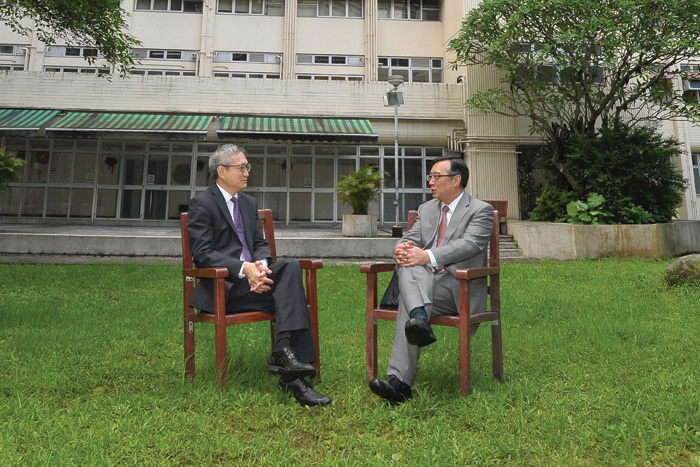Changing places, exchanging views – current and future CCEs on leadership and leisure
July will see two new names on the Hospital Authority’s list of Cluster Chief Executives (CCE). Dr Tony Ko will become HA’s youngest serving CCE when he takes reins from Dr Lo Su-vui in New Territories West Cluster (NTWC). Dr Lo, who has been serving as Deputising CCE for the past six months, will return to his former post of Director (Strategy and Planning) at Head Office, while Dr Chui Tak-yi will take over as CCE of Kowloon East Cluster (KEC) upon the retirement of Dr Joseph Lui.
HASLink recently had the opportunity to learn more about the healthcare objectives and personal interests of these four leaders through dialogues covering topics ranging from management philosophy to retirement and the football World Cup.
SV: Dr Lo Su-vui TK: Dr Tony Ko
TK: Dr Lo, as you prepare to return to the Strategy and Planning Division at Head Office, how do you feel about your six months in NTWC?
SV: It has been an interesting experience. Everything moves at a faster pace in a hospital and you see the results of your actions more quickly than in an office environment. My time in NTWC has given me a broader perspective that will certainly prove helpful for strategic planning in future – although I won’t be granting NTWC any special favours (laughs)! That said, HA has concurred that NTWC and New Territories East Cluster will be given particular attention in future development plans.
TK: Shortly after you took up the reins of NTWC, the Surgical Outcomes Monitoring and Improvement Programme was announced. What are the parts that most impressed you?
SV: The Programme did bring negative feelings to colleagues in NTWC. Fortunately staff morale was not seriously affected. Our further investigations found that the major problem was one of overloading in wards. I discussed the issue with HA Chief Executive, following which we were allocated additional resources to set up more wards in TMH and Pok Oi Hospital, as well as more high-dependency units in TMH.
TK: During the past six months you mapped out a clear direction and laid a good foundation for the Cluster’s future development. Your impressive accomplishments in such a short period of time have certainly set the bar very high for me as incoming CCE!
SV: I’m confident you will handle the pressure admirably – you have excellent interpersonal skills and high emotional intelligence. My best advice is to keep in continued and open communication with staff. What will be your first priority in your new role?
TK: I figure that my immediate focus will be on the feasibility study for the TMH Operation Block extension, and on the design and services planning at Tin Shui Wai Hospital.
SV: Doing exercise is a way to wind down. I like golf and you are a football lover. Which team do you think will win the World Cup this year?
TK: Germany. The German players are very strong psychologically. They have stringent training and are well prepared for every match. They stick to their agreed match strategy irrespective of the opposition or the match pressure, which is vital to being a successful football team.
JL: Dr Joseph Lui TY: Dr Chui Tak-yi
TY: After working in public hospitals for nearly 30 years, what is your most memorable experience?
JL: Unquestionably it’s our battle against SARS in 2003. Many of our colleagues put their own health at risk to take care of SARS patients and helped prevent the spread of the disease to other patients. Our colleagues never shrank from the task and demonstrated great courage in their selfless dedication to defending the health and well-being of the people of Hong Kong. TY, you will soon be the head of KEC – what do you see as the major challenges for the cluster?
TY: The biggest challenge will be the formulation of the cluster’s Clinical Service Plan. The objective is to see individual hospitals play to their unique strengths while cooperating closely with one another to optimise the provision and use of inter-hospital services. I hope the CSP will provide colleagues with a deeper understanding of our future development strategy and their vital – and valued – role in making this a reality. Joseph, you have led the KEC for many years, could you share some tips on good management?
JL: Transparency is the most important element of good management – not only to be open in one’s actions and motivations, but also to establish clear and open two-way communication with one’s colleagues. Perhaps 70% of our time is spent on various forms of communication with colleagues.
TY: I agree that communication is the key to good management. In interacting with colleagues at all ranks – whether in the management team or working on the frontline – we must strive to understand their priorities and concerns. So Joseph, what is your plan for ‘managing’ your retirement?
JL: I’m still planning! I haven’t had much time to spend with my family in recent years so I will join them for an overseas trip in July. Longer term, I may do some part-time anesthesiology clinical work – I think it’s time for me to pick up my specialty. I have also accepted HA’s invitation to act as an advisor on some new projects in HA hospitals.![]()



